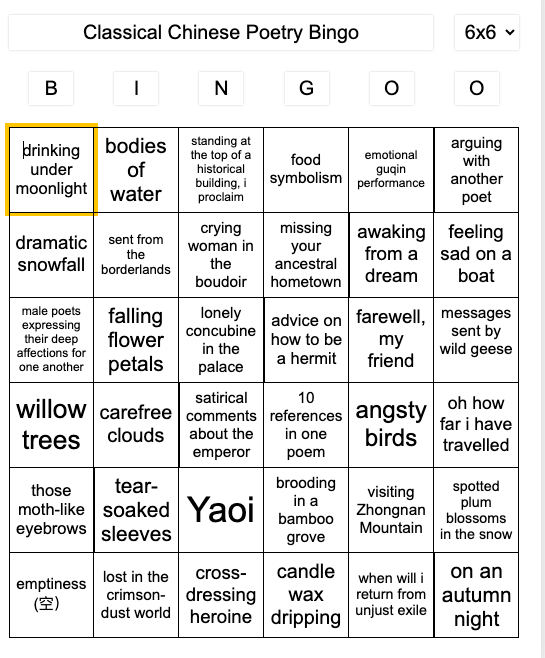Mandarin pronunciation guide:
Qiu Jin 秋瑾:
Qiu is the last name and Jin is the first name. (In Chinese, family names always appear first, and I have kept that tradition for authors publishing in China.)
Zhang Qiaohui 张巧慧:
Zhang is the last name and Qiaohui is the first name.
Fei Ming 废名:
Fei Ming is a pen name that means “to get rid of one’s name.” The name should always be treated as one word.
Xiao Xi 小西:
Xiao Xi is a pen name that means “Little West.” The name should be treated as one word.
Dai Wangshu 戴望舒:
Dai is the last name and Wangshu is the first name. Note that Dai Wangshu is a pen name.
Zhīyīn 知音 kindred spirit(s):
Playlist
- I made a playlist featuring some of the songs that I listened to while translating poems and writing essays for the collection. The term “知音,” which I often translate into “kindred spirit,” means literally “the one who understands your songs.” Qiu Jin wrote a lot about kindred spirits (zhiyin), so hopefully folks will enjoy this as much as I do.

Classical Chinese Poetry Bingo Sheet
I created this to introduce folks to some common motifs and tropes in Classical Chinese poetry. Some of these elements show up in the modern poetry I translate too. Tag yourself. I’m “feeling sad on a boat.”
Corrections to typos in the first print run of the physical book:
- Page 77: Nuwa should be Nüwa
- Page 95: Dai Wangshu was not *only* one of the most celebrated and renowned poets of his generation (sorry, Dai Wangshu!! lol)
- Page 101, footnote 7: Xiānggaˇng should be Xiāngǎng, yuˇxiàng should be yǔxiàng, yıˇngkù should be yǐngkù, chūbaˇnshè should be chūbǎnshè
- Page 101, footnote 11: Shànghǎi wàiyǔ, not Shànghǎi wáiyu (it should be à rather than á)

